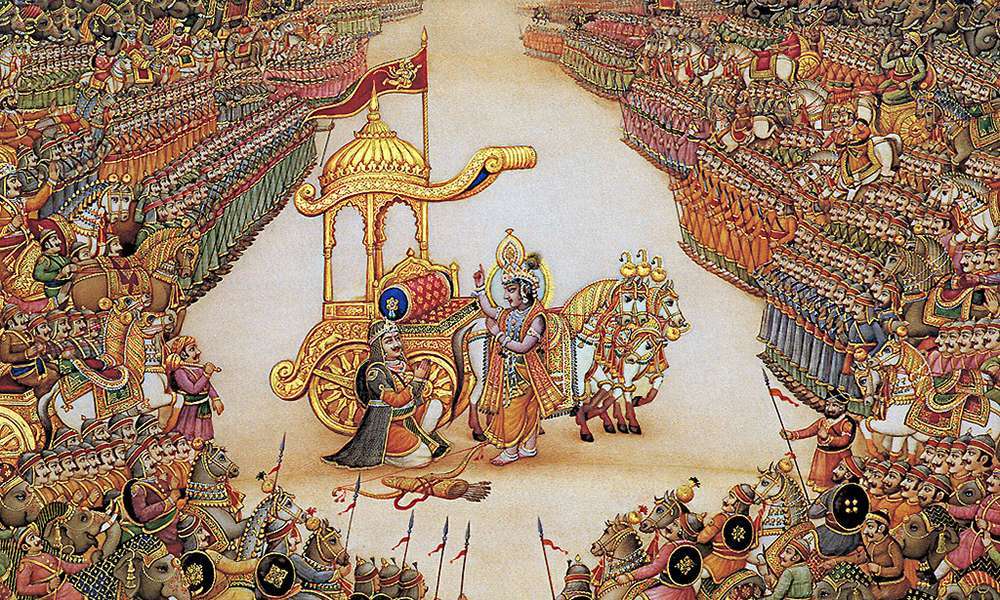Mahabharata evokes so many responses: anger, confusion, betrayal, love, unadulterated devotion, and, the fight for justice. It is one of the most thorough political books ever written with, the greatest political leader ever, Krishna leading from the front.
Although the Mahabharata was written centuries ago, it is a handbook for all times, including the present. Not only does it teach us about the fight for what is right, it also teaches us to fight smart, righteously albeit cunningly and it shows us the immense destructive power of war.
Mahabharata was a family dispute gone horribly wrong. The leaders of the family, unable to step in and tamper with the greed and desires of a few resulted in countless deaths of soldiers and citizens on both sides. The price of war is often heavily paid by those whose daily life will change little from victory or defeat. As such, the families of the soldiers who were left behind, bereft, in their loved ones' deaths, stood to gain minimally by who sat on the throne of Hastinapur but they paid the ultimate price.
Some might argue that between Duryodhana and Yudhishthira, it mattered who reigned because the Kaurava prince was malicious. The truth, as I see it is Duryodhana was not evil, although the mental abuse he sustained over his entire life from his uncle Shakuni meant he hated the Pandavas with a burning passion. There are many records that state during that during the Pandavas exile, Duryodhana had proven himself a worthy successor and took great care of the kingdom, often handing out alms to the poor of Hastinapur. Perspective matters. As does mental health, especially in a ruler.

No one is inherently only wicked or only good; humans are usually a mixture depending on our life experiences. Shakuni hated the Kaurava clan because his sister had to marry a blind man after Bhishma almost destroyed the kingdom of Gandhara and took the entire royal family as prisoner. While in prison, Shakuni’s father, the king, disabled his son by causing his leg irreparable harm, a reminder of his ultimate desire that the Kaurava clan be destroyed. Smaller nations often pay a greater price in war than larger nations, with big defense budgets. But in the end, smaller nations can create wide discord in larger nations that lead to internal strife and conflict.
War causes environmental destruction on a massive scale and if the Mahabharata was a nuclear war as some have suggested it could have caused irreversible harm to the ecosystem. There are several cases of harm to the environment documented in the story. Take the case of Khandavaprastha, the territory given to the Pandavas to establish their kingdom. This area was a dense jungle (the word khandava means forest), which was completely cleared of its ecology so palaces could be erected. Arjuna and his brothers burnt the forest to the ground, along with the many creatures who called it home so they could build their city of Indraprastha. The creatures vowed revenge and a few generations later, we learn that Emperor Parikshit dies of a snakebite, bringing the story of destruction full circle. Taking care of the environment is in our best interests; it is important to preserve it today so future generations may be able to live peacefully.
There are so many cases why the Mahabharata is relevant today but perhaps the one that derives special meaning for me is when Krishna tells Arjuna to fight because that is his job even though it means that Arjuna must kill his loved ones. This is a poignant moment in the story when the Bhagavad Gita is narrated and Krishna tells Arjuna to do his duty. Sometimes we must fight those we love, those who mean everything to us if they are wrong. This fight is not an egotistical one, it is a moral lesson that your soul needs to learn to elevate itself. In those situations, we cannot worry about what the world will think of us, who will harangue us and how we will be misrepresented (because we will be). It is always hard to do the right thing, but it is only in those moments that one develops true mettle.
Of course, I would be remiss if I did not mention the power of a woman and the need to treat her right because the feminine energy is the divine creation of this universe. Show disrespect to one and you will see her wrath in more ways than you can count.
Rupande's book, Trihayani is now available across the world except India. The book is expected to release in India, in print, in the next month.


Comments